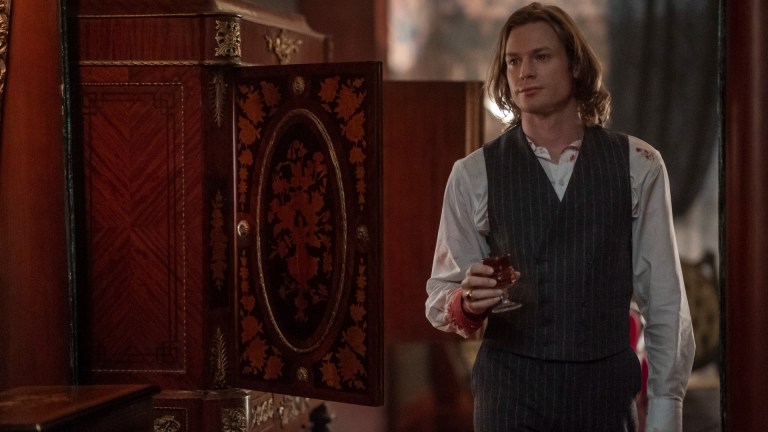Interview with the Vampire: The One Lestat Moment Sam Reid Can’t Wait For
Sam Reid says music soothes the savage breast of Lestat de Lioncourt, and he can’t wait for a duet in Interview with the Vampire.

This article contains spoilers for Interview with the Vampire episode 3.
Anne Rice’s Interview with the Vampire episode 3 is called “Is My Very Nature That of A Devil,” and while Louis de Pointe du Lac (Jacob Anderson) ponders the satanic elements, his maker Lestat de Lioncourt (Sam Reid) purloins the “devil’s music,” as jazz was called in its birth. The sound spread chord clusters and hot licks across the country, revelatory to listeners and revolutionary in its freedom. This mirrors the relationships at the center of the series, those between the two vampires, and their changed natures relating to regret and reconciliations. Vampires and music are dangerous, and precious.
One of the high points of the episode comes during the piano duel at Louis’ all-around entertainment club, The Azalea House. Lestat accuses the resident pianist Jelly Roll Morton (Kyle Roussel) of lazy playing, and repetitive vamps. This turns into a lighthearted, blue-languaged challenge, which is very entertaining for the audience, and oddly disconcerting for Louis.
Lestat, a classically trained musician, sits down at the piano, after some prompting from the riffing house ivory-tinkler, to play one for the boys going off to war. “Know your enemies,” he declares, and fires the first round. He begins by playing a rather uptight version of “Minuet in G Minor,” by Christian Petzold, while describing how many children the amorous Johann Sebastian Bach fathered. Then he lets loose with a left-hand riff and makes the piece swing. If Louis can “play vegetarian,” Lestat can “play the fool.”
While speaking with Den of Geek about the Interview with the Vampire premiere, Sam Reid explained how music was the key which tuned him into the Lestat’s repertoire.
“In The Vampire Lestat, Lestat is with Nicki [Nicolas de Lenfent] after one of their late-night sessions,” Reid tells us. “He has an existential crisis, and Nicki’s violin playing, and music, takes him out of it.” In the book, Lestat and Nicolas were childhood friends in rural France. Their reunion is a turning point, with very sad undercurrents.
In life, on a sunny afternoon, Lestat lies on a lumpy straw mattress while Nicolas rips into Mozart, tearing “the notes out of the violin,” while leaning his whole body “into the music, to press his soul like an ear to the instrument.” Lestat is as struck by its rawness as its intensity. One is a fiddler, the other an actor. One is on his way down, the other is a wolf-killer. When Lestat gains immortality as a vampire, he realizes the cost is immeasurable.
“He is very detached from humanity and has no desire to be a part of it, because he’s obviously dealing with what happened to him,” Reid tells us. “He got ripped out of this. It’s basically just that dynamic.”
The series has been letting facets of Lestat’s past bleed into a story which begins with Louis’ narrative, and his adoration of all things musical has been a consistent theme. Lestat will feed off a bad performance, but a gifted artist is too much of a delicacy to devour for sustenance. Musicians feed the spirit, and the vampire needs it live, whether kicking in the jazz clubs or screaming in the opera house. These dueling solos will coalesce in beautiful discordant harmony in an upcoming scene, enthuses the actor who learned piano to play Louis.
“I thought it was so fascinating, so well-written by Rolin,” Reid says. “Holding on to the parts of humanity that you love, that you can’t let go of, but you have no choice but to embrace your monster nature. I thought it was such a really interesting question.”
